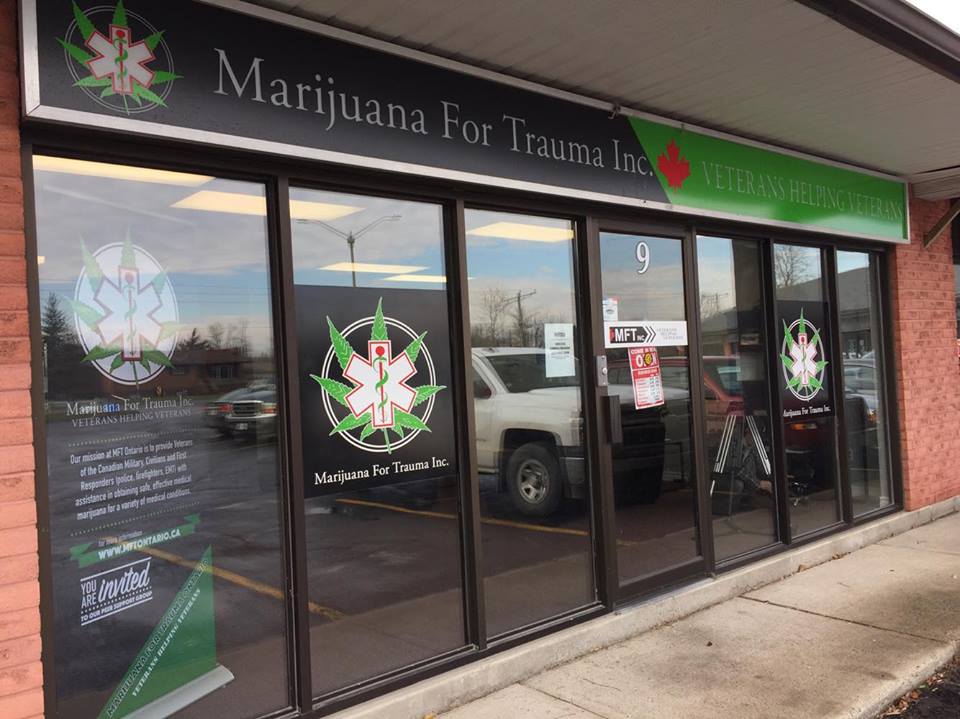By Joseph Carin [1] and Brendan Burke [2]
BELLEVILLE – Members of a local organization that helps provide medical cannabis to veterans in need are expressing concerns over the federal government’s decision to scale back the amount it reimburses them for medicinal marijuana.
The Trenton branch of Marijuana for Trauma [3] – a New Brunswick-based network that guides veterans suffering from post-traumatic stress disorder [4] and chronic pain in obtaining a medical-marijuana prescription through the Department of Veterans Affairs – has voiced concern via social media [5] following last week’s announcement that Ottawa will cut reimbursement for medical cannabis.
Minister of Veterans Affairs Kent Hehr plans to cut back [7] the reimbursement limit for eligible veterans from 10 grams of pot per day to three due to the costs of the coverage program.
Since the program began in 2008, there has been a steady increase in the number of veterans using the program and thus in its overall costs. From April to September this year, the government spent $31 million to reimburse 3,071 veterans – more than $10,000 per user.
Robert Kennedy, president of the Marijuana for Trauma office in Trenton, told QNetNews that Ottawa could have tried to cut its costs in different ways. “Perhaps asking the licensed (pot) producers to lower their cost would have been an effective alternative,” he said.
 [8]
[8]Robert Kennedy says he fears veterans who can’t get the medical marijuana they need will fall back on more dangerous drugs. Photo by Joseph Carin, QNet News
“Not everyone is on 10 grams” a day, he said. “We are looking at varying prescription levels from doctors all based upon different degrees and types of injury. You see people that receive small prescriptions of one or two grams for anxiety issues, whereas the amount might differ for veterans who are suffering chronic ailments and/or post-traumatic stress disorder.”
Kennedy said he fears that veterans who can no longer get the amount of medical marijuana they need may fall back on harmful opiate-based medication – leading veterans down a potentially toxic path that he himself knows all too well.
Veterans Affairs says its decision was based on research done by Canadian medical experts recommending a cautious approach to cannabis for medical use. They indicated that one or two grams a day was a reasonable amount for the vast majority of cases. But members of Marijuana for Trauma say that this isn’t enough justification for the cutback in veterans’ prescriptions.
 [9]
[9]Andrew Brown says the federal government is paying too much for the medical marijuana it supplies to veterans. Photo by Joseph Carin, QNet News
“What we found here is that it takes a lot more cannabis to get troops and civilians off of other medication that may be harmful to them,” said Andrew Brown, vice-president of Marijuana for Trauma in Trenton.
Many higher-dose prescriptions are for older veterans who are using cannabidiol [10], otherwise known as CBD, to treat chronic pain or post-traumatic stress disorder sustained during their service, Brown said.
While Brown touts the medicinal properties of cannabis, he said he understands its limits.
“We recommend that the patient stays on whatever medical treatment plan that their doctors advised them and add cannabis to it,” he said. “Obviously do not drop any other of your prescriptions just because you have cannabis … it doesn’t work that way. It’s not a miracle drug. It’s not a cure-all. It doesn’t work for everybody.
Despite being opposed to the new federal regulations, Brown agrees that the government is paying too much for the medical marijuana it buys.
“There is no reason why Veterans Affairs should be paying full price when they are covering 3,500 veterans in Canada. It is ridiculous. But this is no reason to punish the patients because of the cost,” he said.
Marijuana for Trauma is waiting to see what the implications of the new regulations are, Brown said. If patients can still get a higher-dosage prescription based on a recommendation from their psychiatrist or pain-management clinic and Veterans Affairs will cover the cost, “I don’t think we are going to have too much of a problem.”
Members of the organization are planning to demonstrate on Parliament Hill on May 18, but it is not an official protest by Marijuana for Trauma, Brown said.
